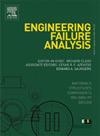Failure analysis of the premature fan blade-off in aeroengine containment test
IF 4.4
2区 工程技术
Q1 ENGINEERING, MECHANICAL
引用次数: 0
Abstract
The fracture of fan blades caused by the foreign object damage is a serious threat to the aeroengine service safety. To investigate the impact effect after blade-off, an aeroengine containment test is conducted under non-vacuum conditions. However, the pre-notched fan blade detaches prematurely at a rotational speed below the design threshold. To explain this anomaly, this study combines the numerical and theoretical approaches to analyze the failure causes. Firstly, a structural model of the pre-notched fan blade is established, and modal analysis is conducted to assess the potential influence of resonance on failure. Subsequently, considering the rotor–stator interference caused by support plates, a model of the unsteady flow field is established. Finally, a fluid–structure interaction (FSI) method is employed to explore the influence of coupled aerodynamic and centrifugal loads on stress distribution. The results indicate that resonance effects are not the primary cause of blade failure. In the non-vacuum environment, the introduction of aerodynamic load subjects the blade to complex multiaxial stress states. Compared to the condition with only centrifugal loading, the Mises stress at the notch increases by 15.2%, exceeding the ultimate tensile strength of the TC4 alloy and finally leading to the premature blade-off.
航空发动机安全壳试验中风扇过早脱落失效分析
由异物损伤引起的风扇叶片断裂是严重威胁航空发动机使用安全的问题。为了研究叶片脱落后的冲击效应,在非真空条件下对航空发动机进行了安全壳试验。然而,在转速低于设计阈值时,预缺口风扇叶片过早脱落。为了解释这一异常现象,本文将数值方法与理论方法相结合,分析其破坏原因。首先,建立了预缺口风扇叶片的结构模型,并进行了模态分析,评估了共振对失效的潜在影响。随后,考虑支撑板引起的动静干涉,建立了非定常流场模型。最后,采用流固耦合(FSI)方法探讨了气动载荷和离心载荷耦合对应力分布的影响。结果表明,共振效应不是叶片失效的主要原因。在非真空环境下,气动载荷的引入使叶片处于复杂的多轴应力状态。与单纯离心加载相比,缺口处的Mises应力增加了15.2%,超过了TC4合金的极限抗拉强度,最终导致叶片过早脱落。
本文章由计算机程序翻译,如有差异,请以英文原文为准。
求助全文
约1分钟内获得全文
求助全文
来源期刊

Engineering Failure Analysis
工程技术-材料科学:表征与测试
CiteScore
7.70
自引率
20.00%
发文量
956
审稿时长
47 days
期刊介绍:
Engineering Failure Analysis publishes research papers describing the analysis of engineering failures and related studies.
Papers relating to the structure, properties and behaviour of engineering materials are encouraged, particularly those which also involve the detailed application of materials parameters to problems in engineering structures, components and design. In addition to the area of materials engineering, the interacting fields of mechanical, manufacturing, aeronautical, civil, chemical, corrosion and design engineering are considered relevant. Activity should be directed at analysing engineering failures and carrying out research to help reduce the incidences of failures and to extend the operating horizons of engineering materials.
Emphasis is placed on the mechanical properties of materials and their behaviour when influenced by structure, process and environment. Metallic, polymeric, ceramic and natural materials are all included and the application of these materials to real engineering situations should be emphasised. The use of a case-study based approach is also encouraged.
Engineering Failure Analysis provides essential reference material and critical feedback into the design process thereby contributing to the prevention of engineering failures in the future. All submissions will be subject to peer review from leading experts in the field.
 求助内容:
求助内容: 应助结果提醒方式:
应助结果提醒方式:


